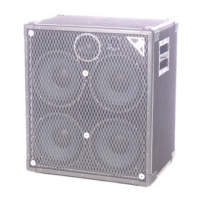Acme Low B Systems for Bass Guitar: Introduction
Congratulations on your purchase of what I believe is a unique product in
a crowded field. The Acme Low
B systems were introduced because I felt the existing products in their class were inadequate in
performance and rather expensive. And as a free
lance drummer educated in physics, I've had a unique
opportunity to be exposed t
o a wide variety of bass guitar equipment, and to understand the causes of
the coloration and distortion present in most.
often have you heard a bassist say, "The best sound I get is when I'm in the studio?" Why is this?
When in the studio, running d
irectly into the board, the biggest difference isn't in the electronics. Any
quality bass amplifier is capable of producing a lo
range signal to drive a speaker.
The difference is in the speaker itself. When “running direct,” a bassist
hears his instrument reproduced
not through a typical limited
bandwidth "bass guitar speaker," but through a low
studio monitor. It stands to reason then, that this "perfect" sound could be duplicated onstage only
a speaker of similar characteristics. This is the concept behind the Acme Low B systems.
My basic approach to this business is
, “If it ain’t broke, don’t fix it.” The high cost and ho
performance of many popular bass speakers though, offered an excel
lent opportunity for a small
business to fill a niche. Frankly, if I had sensed a similar need for a better PA, or a better hi
it speaker, the first products bearing the Acme Sound name would have been of another type, not
But for now, this is what Acme Sound has to offer. The Low B systems for bass guitar.
Happily, the same laws of physics
govern the performance of all different types of loudspeakers. And I
hope to find other needs to fill which are as obvious as w
as the need for better compact bass guitar
speakers. I've had my eye on ultra
compact PA speakers to compete with the Elite Micr
which sound good, but are somewhat lacking in bass and are quite expensive. The new Low B
Early on, it was anticipated that a definitive owners manual would emerge as questions w
musicians using the speakers. It has become apparent with the passage of time, however, that creating an
anual is more of an ongoing process than a one
time job; it'll never be done as long as people
can think of other questions to a
sk, or I think of other things to say (That could take a while!). So this is the
latest version of "Owners Notes," subject to ch
ange without notice! The purpose of this guide is to
anticipate some questions and provide basic information on use of your syst
em to help you use it to it's full
potential. I will further amend this guide to answer questions as they come in, and ask for y
IMPORTANT TO READ BEFORE YOUR FIRST USE!
Two very important points of information which will
optimize your woofers for maximum power
handling, and increase your speaker’s chances for a long, trouble
fers in our Acme Low B Series II models have a break
in period. The surrounds on these
woofers have a higher stiffness new
box than they do after some hours of use. This has two

